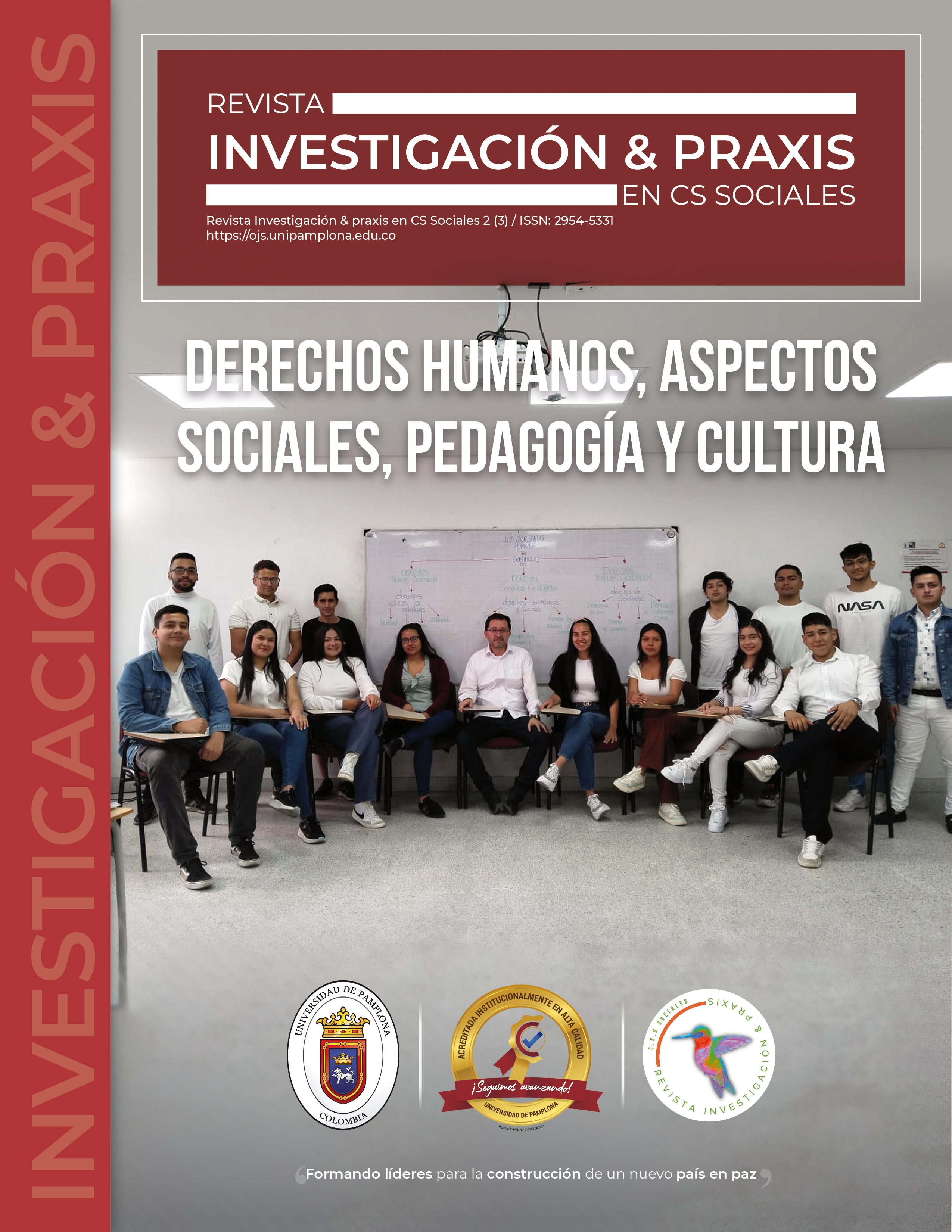La religiosidad como pilar fundamental en la salud humana
DOI:
https://doi.org/10.24054/ripcs.v2i4.2689Palabras clave:
Religiosidad, Salud física y psicológica, Fortalezas psicológicas, Resiliencia emocional, Bienestar general, Influencia culturalResumen
Este artículo presenta una investigación cualitativa sobre la relación entre religiosidad y salud humana, revelando cómo las creencias religiosas influyen en el bienestar físico y mental. Entrevistas en profundidad a siete participantes evidenciaron una conexión significativa, destacando prácticas como la oración y la meditación asociadas con beneficios para la salud. El estudio subraya la importancia de considerar la dimensión religiosa en la promoción de la salud, señalando la necesidad de futuras investigaciones para comprender mejor estos mecanismos y su aplicabilidad en la atención médica y la salud pública.
Citas
Akin-Little, K.A., Little, S.G. & Delligatti, N. (2004). A preventive model of school consultation: incorporating perspectives from positive psychology. Psychology in the Schools, 41 (1), 155-162.
Carver, C. & Scheier, M. (2001). Optimism, pessimism, and self-regulation. En E. Chang (Ed.). Optimismand pessimism. Implications for theory research and practice. Washington, D.C: American Psychological Association.
Chico, E. L. (2002).Optimismo disposicional como predictor de estrategias de afrontamiento. Psicothema, 14 (3), 544-550.
Danner, D., Snowdon, D. & Friesen, W. (2001). Positive emotions in early life and longevity: findings from the nun study. Journal of Personality and Social Psychology, 80, 804-813.
Diener, E. & Lucas, R. (1999). Personality and subjective well-being. En D. Kahneman, E. Diener & N. Schwartz (Eds.). Well-being: The foundations of Hedonic Psychology(pp. 213-229). New York: Russell Sage Foundation.
Diener, E. & Seligman, M.E.P (2002). Very Happy people. Psychological Science, 13 (1), 81-84.
Eccles, J.S. & Gootman, J.A. (2002). Community programs to promote youth development. Washington, D.C: National Academic Press.
Fredickson, B.L. (2001). The role of positive emotions in positive psychology. American psychologist, 56, 218-226.
Fredrickson, B.L. (2000). Positive emotions. En C.R. Zinder & S. J. López (Eds.). Handbook of positive Psychology(pp.120-134). New York: Oxford University Press.
Jaycox, L.H., Reivich, K.J., Guillham, J. & Seligman, M.E.P.(1994). Prevention of depressive symptoms in school children. BehavioralResearch Therapy, 32 (8), 801-816.
Jenson, W.R., Olympia, D., Farley, M. & Clark, E. (2004). Positive psychology and externalizing students: Awash in a sea of negativity, Psychology in the Schools, 41, 67-80.
Lykken, D. (2000). The nature and nurture of joy and contentment. New York: St. Martin s Griffin.••Lyubomirshy, S. (2001). Why are some people happier than other? American Psychologist, 56, 239-249.
Meyers, J. & Nastasy, B.K. (1999).Primary prevention in school settings. En T. Gutkin & C. Reynolds(Eds.). The handbook of school psychology(3ª. ed.). (pp. 764-799). New York: Wiley.
Miguel-Tobal, J.J., Casado, M.I., Cano-Vindel, A. & Spielberger, C.D. (1997). El estudio de la ira en los trastornos cardiovasculares mediante el empleo del Inventario de Expresión de Ira Estado y Rasgo-STAXI. Ansiedad y Estrés, 3 (1), 5-20.
Nezu, A.M., Nezu, C.M. & Blissett, S.E. (1988). Sense of humor as a moderator of relation between stressful events and psychological distres: A prospective analysis. Journal of Personality and social Psychology, 54, 520-525.
Peterson, C. (2000). The future of optimism. American Psychologist, 55, 44-55.
Peterson, C., Maier, S.F. & Seligman, M.E.P. (1993). Learned Helplessness. A theory for the age of personal control. New York: Oxford University Press.
Resnick, S., Warmoth, A. & Selin, I.A. (2001). The humanistic psychology and positive psychology connection: implications for psychotherapy. Journal of Humanistic Psychology, 41, 73-101.
Scheier, M. & Carver, C. (1987). Dispositional optimism and well-being: The influence of generalized outcome expectancies on health. Journal of Personality, 55, 169-210.
Seligman, M.E.P. & Christopher, P. (2000). Positive Clinical Psychology, recuperado el 12 dejunio de 2006 del sitio Web del Positive Psychology Center : http:w w w. p p c . s a s . u p e n n . e d u /posclinpsychchap.htm
Schneider, S.L. (2001). In search of realistic optimism. American Psychologist, 56, 250-263.
Seligman M.E.P. (1998). Learned optimism: How to change your mind and your life. (2a. ed.). New York, NY: Pocket Books.
Taylor, S.E., Kennedy, M.E., Reed, G. M., Bower, J.E. & Gruenewald, T.L. (2000). Psychological resources. Positive illusions and health. American Psychologist, 35, 99-109.
Terjesen, M.D. Jacofsky, M. Froh, J & DiGiuseppe, R. (2004). Integrating positive psychology into schools: Implications for practice. Psychology in the Schools, 41 (1), 163-172.
Valliant, G. (2002). Aging well. Boston: Little Brown and Company.
Vázquez, C. (2006). La psicología positiva en perspectiva. Papeles del psicólogo, 27 (1), 1-2.
Vera, B. (2006). Psicología positiva. Una nueva forma de entender la psicología. Papeles del psicólogo, 27 (1), 3-8.
Allport, G.W. & Ross, J.M. (1967). Personal Religious Orientation and Prejudice. Journal of Personality and Social Psychology, 5, 432-443
Jaffé, A. (2005). Jung, recuerdos, sueños, pensamientos. Barcelona: Seix Barral.
Peterson, C., & Seligman, M.E.P. (2004). Character strengths and virtues. Ahan-dbook and classification. Washington D. C.: American Psychological Asso Piedmont, R. L. &
Friedman, P. H. (2012). Spirituality, Religiosity, and Subjective Quality of Life. Handbook of social indicators and quality of life research. Netherlands: Springer Netherlands, pp. 313-329.
Descargas
Publicado
Versiones
- 2023-12-28 (5)
- 2023-12-01 (4)
- 2023-12-01 (3)
- 2023-01-12 (2)
- 2023-12-28 (1)
Cómo citar
Número
Sección
Licencia
Derechos de autor 2023 Revista Investigación & praxis en CS Sociales

Esta obra está bajo una licencia internacional Creative Commons Atribución 4.0.
Los autores que publican en la revista se acogen al código de licencia CC BY. Esto significa que se permite a terceros acceder, descargar y utilizar lo publicado en la revista siempre que se les dé el reconocimiento de propiedad intelectual al autor original. Esto incluye la obligación de proporcionar crédito adecuado por su trabajo y una indicación adecuada de cualquier cambio realizado. No se permite el uso comercial de la obra sin autorización previa del autor.






